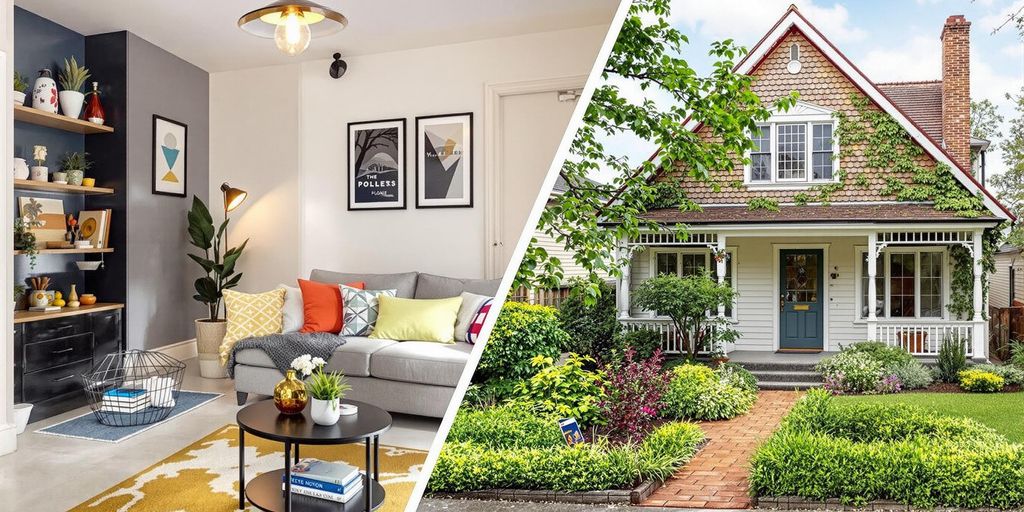Deciding whether to rent or buy a home in 2025 is a big deal for a lot of people. It’s not just about where you’ll live but also about your money and lifestyle. Some folks love the idea of owning a place, building equity, and having the freedom to paint the walls any color they want. Others prefer the flexibility of renting, not having to worry about repairs, and being able to move easily if a new job or adventure comes up. Both options have their ups and downs, and what’s right for one person might not work for another. Let’s break down some key points to think about when making this decision.
Key Takeaways
- Renting usually means lower upfront costs than buying, making it easier to get started without a big savings account.
- Homeownership can build equity over time, which is a big plus for those looking to invest in their future.
- Renting offers flexibility, ideal for those who might need to move for work or just like the idea of not being tied down.
- Owning a home provides stability and allows for personalization, but it also comes with maintenance responsibilities.
- The decision between renting and buying often comes down to personal financial situations and long-term goals.
Understanding the Financial Implications of Renting and Buying
Analyzing Upfront Costs
When deciding between renting and buying a home, upfront costs are a major consideration. Renting typically requires a security deposit and the first month’s rent, which is significantly lower than the upfront costs associated with buying a home. Homebuyers need to prepare for a down payment, closing costs, and other fees, which can add up quickly. For instance, a 20% down payment on a $400,000 home would be $80,000, not including additional expenses like inspections and appraisals. In contrast, renters might only need a few thousand dollars to secure a lease.
Monthly Expenses and Budgeting
Monthly expenses for renters and homeowners can vary widely. Renters enjoy predictable monthly payments, which include rent and possibly some utilities. However, they must be mindful of potential rent increases at the end of each lease term. Homeowners, on the other hand, have to budget for mortgage payments, property taxes, insurance, and maintenance costs. While a fixed-rate mortgage offers stability, unexpected repairs can disrupt a carefully planned budget. It’s crucial for both renters and buyers to assess their financial situation and plan accordingly.
Long-term Financial Impact
The long-term financial impact of renting versus buying is a key factor in making a housing decision. Renting provides flexibility but does not build equity. Over time, rent payments can add up significantly without contributing to ownership. Conversely, buying a home allows for equity building, which can be a valuable asset over time. Homeowners also benefit from potential property appreciation, though they face the risk of market fluctuations. It’s important to weigh these factors and consider personal and financial goals when deciding whether to rent or buy.
Evaluating Lifestyle Considerations in Housing Decisions
Flexibility and Mobility
Renting a home often provides a level of flexibility that buying simply cannot match. If your job requires frequent relocations or if you enjoy exploring different neighborhoods and cities, renting might be the best option. You can move with relative ease at the end of a lease term. This flexibility is invaluable for those who prioritize mobility over long-term stability. On the other hand, buying a home ties you to one location, which can be a disadvantage if your circumstances change unexpectedly.
Stability and Community Ties
Owning a home often brings a sense of stability and community belonging. Homeowners tend to stay longer in one place, allowing them to establish deeper roots and relationships within a community. This stability can be particularly important for families looking to provide a consistent environment for their children. It also often means better access to local services and schools, which can be a deciding factor for many.
Personalization and Customization
One of the joys of homeownership is the ability to personalize and customize your living space. Whether it’s painting the walls, renovating the kitchen, or landscaping the garden, owning a home allows you to create an environment that truly reflects your personal tastes and lifestyle. Renters, however, are often limited by lease agreements that restrict modifications to the property. While some landlords may be flexible, significant changes are usually out of the question, making it harder to make a rented space feel like home.
In the end, the decision between renting and buying is deeply personal and depends on individual lifestyle priorities. For some, the freedom and flexibility of renting outweigh the benefits of stability and personalization offered by homeownership. For others, putting down roots and having a space to call their own is worth the trade-off in flexibility.
When considering financial considerations, it’s crucial to weigh these lifestyle factors alongside the economic aspects to make a decision that aligns with both your current needs and future aspirations.
Assessing Market Trends and Economic Factors in 2025

Current Real Estate Market Conditions
In 2025, the global economy shows steady but unpredictable growth. Inflation impacts living costs, including the housing market. Demand for homes is high, but supply isn’t keeping up, causing home prices and rent to rise. People looking to buy or rent are finding it tough, especially in cities where the competition is fierce.
Impact of Interest Rates on Housing
Mortgage rates are hovering around 7-8% this year. This makes monthly payments for new homeowners pricier than before. Many first-time buyers are feeling the pinch, and it’s pushing some to stick with renting. The high rates are a big deal for anyone trying to own a home.
Regional Variations in Housing Costs
Housing costs aren’t the same everywhere. In cities like Gandhinagar, rental prices are climbing because more people are moving in, and the local economy is strong. A two-bedroom place might set you back ₹20,000–₹30,000 a month, which is still cheaper than big metros like Mumbai or Delhi. The price differences across regions can really affect where people decide to live.
In 2025, navigating the housing market feels like walking a tightrope. Balancing costs and finding a place that feels like home is a challenge many are facing. Whether you’re buying or renting, understanding these trends is crucial for making the right decision.
For more insights on how inflation impacts living costs, it’s important to keep an eye on economic trends and market shifts.
Exploring the Benefits and Drawbacks of Renting a Home
Advantages of Renting
Renting a home comes with several perks that appeal to many people, especially those who value flexibility. First, the upfront costs are generally lower. Instead of a hefty down payment, renters typically only need to cover a security deposit and the first month’s rent. This makes it easier for individuals to move into a new place without draining their savings.
Secondly, renting provides a sense of financial predictability. Monthly expenses are mostly limited to rent and utilities, with no surprise repair costs or property taxes to worry about. Speaking of repairs, renters can rest easy knowing that maintenance issues are handled by the landlord, saving both time and money.
Lastly, renting offers more freedom to relocate. Whether it’s for a new job, a change of scenery, or personal reasons, renters can move without the hassle of selling a property.
Challenges and Limitations of Renting
However, renting isn’t without its downsides. A major drawback is the lack of equity building. Monthly rent payments do not contribute to ownership, meaning renters miss out on the potential financial benefits of property appreciation.
Another issue is the possibility of rent increases. At the end of a lease term, landlords may raise the rent, which can make it difficult for tenants to budget long-term. Additionally, renters often face restrictions on personalizing their space. Making significant changes usually requires landlord approval, limiting the ability to truly make a rented house feel like home.
Lastly, renting can sometimes lack stability. Lease renewals aren’t guaranteed, and landlords might decide to sell the property, leaving tenants searching for a new place sooner than expected.
Comparing Renting Costs Across Regions
Renting costs can vary significantly depending on the region. Urban areas often have higher rent prices due to demand and proximity to amenities. In contrast, suburban or rural areas might offer more affordable options. However, these areas may lack the convenience of city living, such as public transportation and entertainment options.
It’s important for renters to weigh these factors when choosing a location. Consideration of lifestyle needs and proximity to work or family can help determine the best fit.
Renting a home might seem like a temporary solution, but it offers unique advantages that can align well with certain lifestyles and financial situations. Weighing the pros and cons carefully can lead to a more informed housing decision.
Exploring the Benefits and Drawbacks of Buying a Home
Advantages of Homeownership
Owning a home comes with a sense of stability and accomplishment. Building equity is one of the biggest perks—each mortgage payment increases your ownership stake, potentially growing your wealth over time. Homeownership also offers tax benefits, like deductions on mortgage interest and property taxes, which can help lower your taxable income. Plus, you have the freedom to personalize your space without needing a landlord’s permission, whether that means painting walls or remodeling the kitchen to fit your style.
Challenges and Risks of Buying
However, buying a home isn’t all roses. The initial costs can be daunting, with down payments, closing fees, and other expenses adding up quickly. And once you’re in, you’re responsible for all maintenance and repairs, which can be expensive and time-consuming. There’s also the risk of market fluctuations—your home’s value might not always go up, and in a downturn, you could end up owing more than it’s worth. Finally, owning a home can tie you down, making it harder to move for a new job or other opportunities.
Equity Building and Investment Potential
Investing in a home can be a smart financial move if you plan to stay put for a while. Over time, as you pay down your mortgage and your home’s value appreciates, you build equity—essentially a forced savings account. This equity can be tapped into for major expenses like college tuition or retirement. However, it’s important to remember that real estate markets can be unpredictable, and there’s no guarantee your investment will always grow.
Homeownership is a big decision that requires careful consideration of both the financial and personal implications. It’s not just about crunching numbers but also thinking about what you want in life and how a home fits into that picture.
In 2025, buyers might find a wider selection of properties and stable home prices, making it an exciting time to consider stepping into the housing market. But it’s crucial to weigh the pros and cons carefully to ensure it aligns with your long-term goals.
Making an Informed Decision: Tools and Strategies

When it comes to deciding whether to rent or buy a home, it’s not just about the numbers. It’s about finding the right balance between your personal goals and financial situation. Here’s how you can make a well-rounded decision.
Utilizing Financial Planning Tools
Financial tools are your best friends when navigating the housing market. They help break down complex numbers into understandable insights. Online calculators can project expenses like mortgage payments, property taxes, and insurance. Some tools even let you compare these with potential rental costs. This way, you can see if buying a home aligns with your budget or if renting might be a smarter financial move.
Consulting Real Estate Experts
Talking to real estate experts can provide clarity. They offer insights into market trends, neighborhood values, and future projections. These professionals can guide you through the maze of paperwork and legalities involved in buying or renting. A good real estate agent can also help you identify opportunities you might not have considered.
Weighing Personal and Financial Goals
Take a moment to reflect on your personal and financial goals. Do you value flexibility over stability? Is building equity a priority for you? Make a list of what matters most. For some, the freedom of renting outweighs the benefits of owning. For others, the long-term investment of buying a home is more appealing.
Consider your lifestyle, career plans, and family needs. Your choice between renting and buying should align with your broader life goals, not just immediate financial considerations.
In the end, whether you decide to rent or buy, the right choice is the one that fits your unique situation. Remember, it’s not just about the money; it’s about finding a place that feels like home.
Conclusion
Deciding whether to rent or buy a home in 2025 is a personal choice that hinges on various factors like your financial situation, lifestyle preferences, and future plans. Renting offers flexibility and fewer responsibilities, which can be appealing if you’re not ready to settle down or handle the costs of homeownership. On the other hand, buying a home can be a wise investment, providing stability and the opportunity to build equity over time. Both options have their own set of challenges and benefits, so it’s crucial to weigh them carefully. Consider your current needs and long-term goals to make the best decision for your circumstances.
Frequently Asked Questions
What are the main advantages of renting a home?
Renting a home usually means lower upfront costs, more flexibility to move, and no worries about maintenance since the landlord takes care of repairs.
What are the main disadvantages of renting a home?
Renting doesn’t allow you to build equity, and rent can increase over time. You also have limited freedom to make changes to your living space.
What are the main advantages of buying a home?
Buying a home lets you build equity, provides stability, and allows you to personalize your space. Homeowners can also benefit from tax deductions.
What are the main disadvantages of buying a home?
Buying a home requires a large upfront cost, and you are responsible for maintenance and repairs. The value of your home can also change with the market.
How do interest rates affect buying a home in 2025?
Higher interest rates mean higher monthly mortgage payments, making it more expensive to buy a home. This can affect how much home you can afford.
Is it cheaper to rent or buy a home in 2025?
Whether renting or buying is cheaper depends on several factors, including location, market conditions, and personal financial situations. Renting might be more affordable in some areas.


